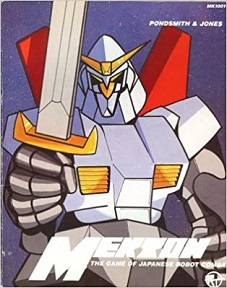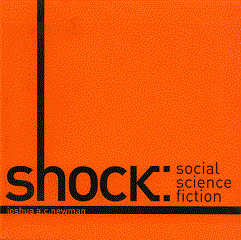This article has multiple issues. Please help improve it or discuss these issues on the talk page . (Learn how and when to remove these template messages)
|
Joshua A.C. Newman is an American role-playing game designer.
This article has multiple issues. Please help improve it or discuss these issues on the talk page . (Learn how and when to remove these template messages)
|
Joshua A.C. Newman is an American role-playing game designer.
Newman is the designer of the Indie role-playing games Under the Bed (2005), Shock: Social Science Fiction (2006), Beowulf (2008), Shock: Human Contact (2010), and The Bloody-Handed Name of Bronze (2016).
In 2012, Joshua A.C. Newman worked with Vincent Baker on a new version of the Mechaton rules as Mobile Frame Zero 001: Rapid Attack (2012), and Newman was able to use this for a successful Kickstarter. [1] Rapid Attack was followed by Mobile Frame Zero 002: Intercept Orbit, a carrier-based spaceship battle game in the same universe.
Newman has also contributed to the book design of several other indie roleplaying games.

Traveller is a science fiction role-playing game first published in 1977 by Game Designers' Workshop. Marc Miller designed Traveller with help from Frank Chadwick, John Harshman, and Loren Wiseman. Editions were published for GURPS, d20, and other role-playing game systems. From its origin and in the currently published systems, the game relied upon six-sided dice for random elements. Traveller has been featured in a few novels and at least two video games.
An alternate reality game (ARG) is an interactive networked narrative that uses the real world as a platform and employs transmedia storytelling to deliver a story that may be influenced by players' ideas or actions.

Steven Eric Meretzky is an American video game developer. He is best known for creating Infocom games in the early 1980s, including collaborating with author Douglas Adams on the interactive fiction version of The Hitchhiker's Guide to the Galaxy, one of the first games to be certified "platinum" by the Software Publishers Association. Later, he created the Spellcasting trilogy, the flagship adventure series of Legend Entertainment. He has been involved in almost every aspect of game development, from design to production to quality assurance and box design.

A troupe system is a way of playing role-playing games in which a group of players takes different roles at different times. The term was coined in Ars Magica, where it referred to each player using multiple characters and, crucially, sharing a pool of characters held in common by the entire group.
Jeff Grubb is an author who writes novels, short stories, and comics and a computer and role-playing game designer in the fantasy genre. Grubb worked on the Dragonlance campaign setting under Tracy Hickman, and the Forgotten Realms setting with Ed Greenwood. His written works include The Finder's Stone Trilogy, the Spelljammer and Jakandor campaign settings, and contributions to Dragonlance and the computer game Guild Wars Nightfall (2006).

Greg Costikyan, sometimes known under the pseudonym "Designer X", is an American game designer and science fiction writer. Costikyan's career spans nearly all extant genres of gaming, including: hex-based wargames, role-playing games, boardgames, card games, computer games, online games and mobile games. Several of his games have won Origins Awards. He co-founded Manifesto Games, now out of business, with Johnny Wilson in 2005.

Mekton is a role-playing game which centers on the conventions of mecha anime and science fiction. It has seen several editions since its introduction in 1984, the most recent, Mekton Zeta being first published in 1994.

Ronald Edwards is a game designer involved in the indie role-playing game (RPG) community, and a game theorist. He created the Sorcerer role-playing game, the GNS theory of gameplay, and The Big Model. Edwards is also co-founder of The Forge, an online community to support indie RPG design and publication.
A spiritual successor is a product or fictional work that is similar to, or directly inspired by, another previous work, but does not explicitly continue the product line or media franchise of its predecessor, and is thus only a successor "in spirit". Spiritual successors often have similar themes and styles to their source material, but are generally a distinct intellectual property.

The Spring Engine, is a game engine for real-time strategy (RTS) video games. The game engine is free and open-source software, subject to the terms of the GNU General Public License v2.0 or later.

Many of the tropes of science fiction can be viewed as similar to the goals of transhumanism. Science fiction literature contains many positive depictions of technologically enhanced human life, occasionally set in utopian societies. However, science fiction's depictions of technologically enhanced humans or other posthuman beings frequently come with a cautionary twist. The more pessimistic scenarios include many dystopian tales of human bioengineering gone wrong.

An indie role-playing game is a role-playing game published outside traditional, "mainstream" means. Varying definitions require that commercial, design, or conceptual elements of the game stay under the control of the creator, or that the game should just be produced outside a corporate environment. Indie role-playing game designers participate in several development communities and game distribution networks. Indie games also grant their own awards committees.

A tabletop role-playing game, also known as a pen-and-paper role-playing game, is a classification for a role-playing game (RPG) in which the participants describe their characters' actions through speech. Participants determine the actions of their characters based on their characterization, and the actions succeed or fail according to a set formal system of rules and guidelines. Within the rules, players have the freedom to improvise; their choices shape the direction and outcome of the game.

Shock:Social Science Fiction is a pen-and-paper indie RPG about the effects of the shock of cultural change on the individuals who make up that culture. The title is a reference to Alvin Toffler's Future Shock, the concept that rapid culture changes leave the members of the culture increasingly challenged by adaptation. The game is designed to be used by players to make "what if" science fiction, rather than science-flavored fantasy adventure. It was first published in 2006 and has since been through two point version updates.

A location-based game is a type of game in which the gameplay evolves and progresses via a player's location. Location-based games must provide some mechanism to allow the player to report their location, usually with GPS. Many location-based games are video games that run on a mobile phone with GPS capability, known as location-based video games.
David Vincent Baker is a designer and theorist of tabletop role-playing games and the owner of indie role-playing games publisher Lumpley Games, which also hosts the archives of The Forge. He and his wife Meguey Baker designed Apocalypse World, the first game in the Powered by the Apocalypse system. Apocalypse World won Game of the Year, Best Support, and Most Innovative game at the 2010 Indie RPG Awards, and was 2011 RPG of the Year at both the Golden Geek Awards and Lucca Comics & Games. Baker also designed Dogs in the Vineyard, which won the 2004 Indie RPG Game of the Year and Innovation Award and was one of three games shortlisted for the 2004 Diana Jones Award.
Jason Morningstar is an American indie role-playing game designer, publishing mostly through Bully Pulpit Games. Morningstar's games often lack a game master and are often set in situations that quickly go unfortunately for the player characters. Grey Ranks, for example, is about doomed child soldiers in the 1944 Warsaw Uprising, and Fiasco is about impulsive crooks pulling heists that are sure to go terribly wrong. With these two games, Morningstar became the only named person to have won the Diana Jones award twice as of 2023. Morningstar also works with academia and industry, consulting on using games for teaching and learning in education, with a focus on health sciences.
Meguey Baker is a tabletop role-playing game designer, independent publisher and quilt historian. She and her husband Vincent Baker designed Apocalypse World, the first game in the Powered by the Apocalypse system.

Zoë Tiberius Quinn is an American video game developer, programmer, and writer. Quinn developed the interactive fiction game Depression Quest, which was released in 2013. In 2014, a defamatory blog post by their ex-boyfriend sparked the online harassment campaign known as Gamergate, during which Quinn was subjected to extensive harassment including doxing, rape threats, and death threats. The following year, Quinn co-founded Crash Override, a crisis hotline and resource center for victims of online harassment.
Whitney "Strix" Beltrán is a narrative designer and Project Narrative Director at Hidden Path Entertainment. Her writing and design career includes the indie game Bluebeard's Bride. She also founded the advocacy initiative Gaming as Other to promote inclusivity in the gaming community.